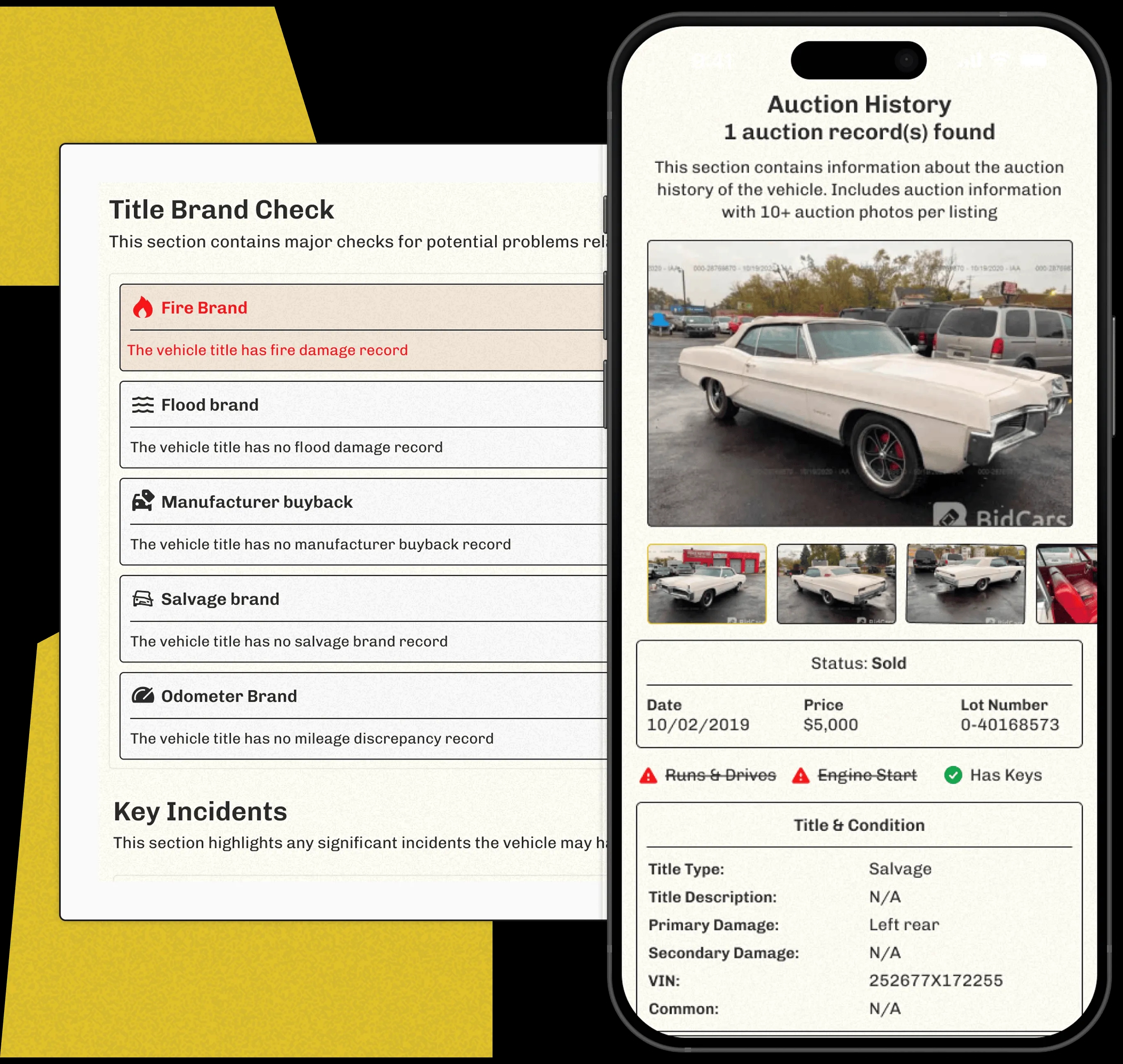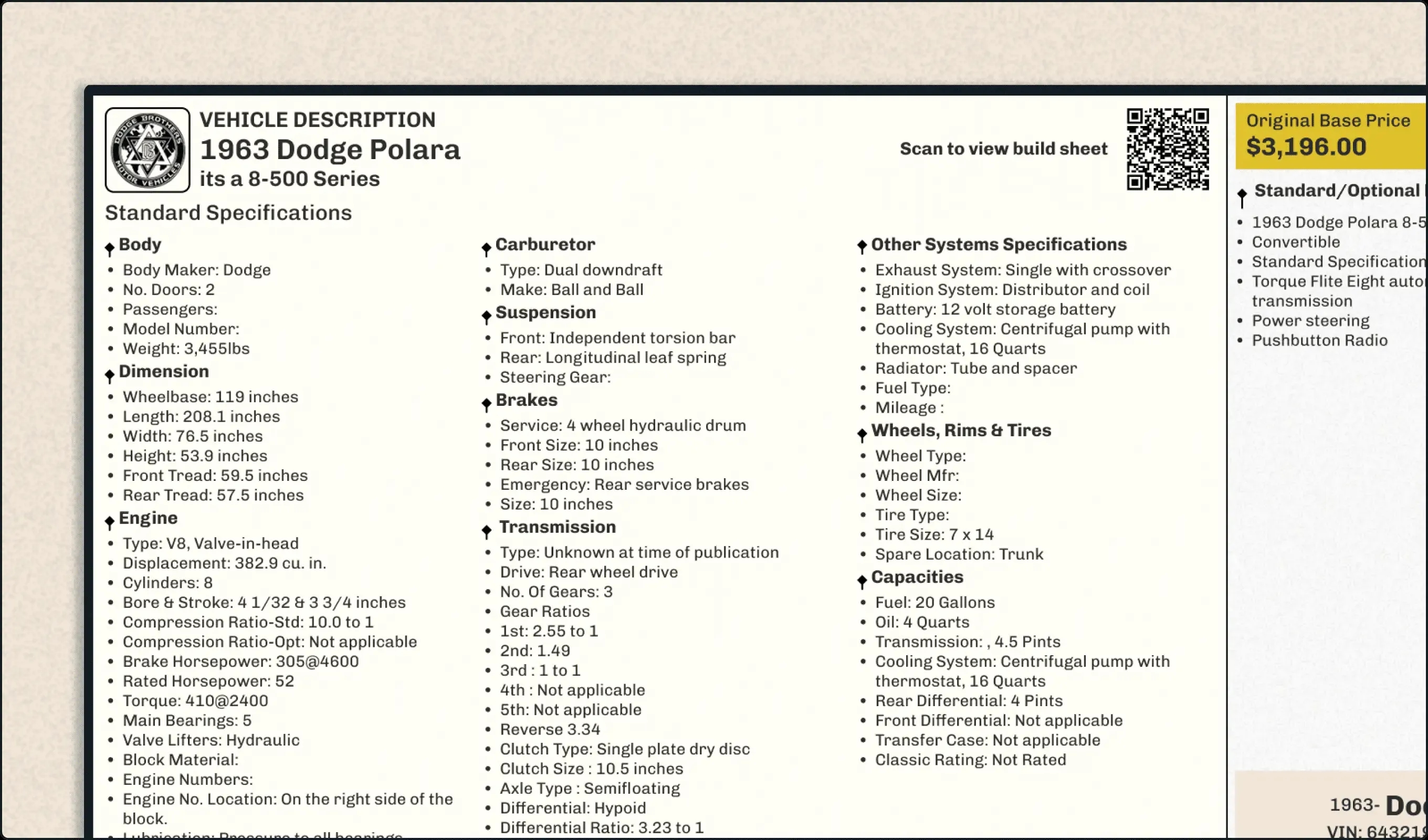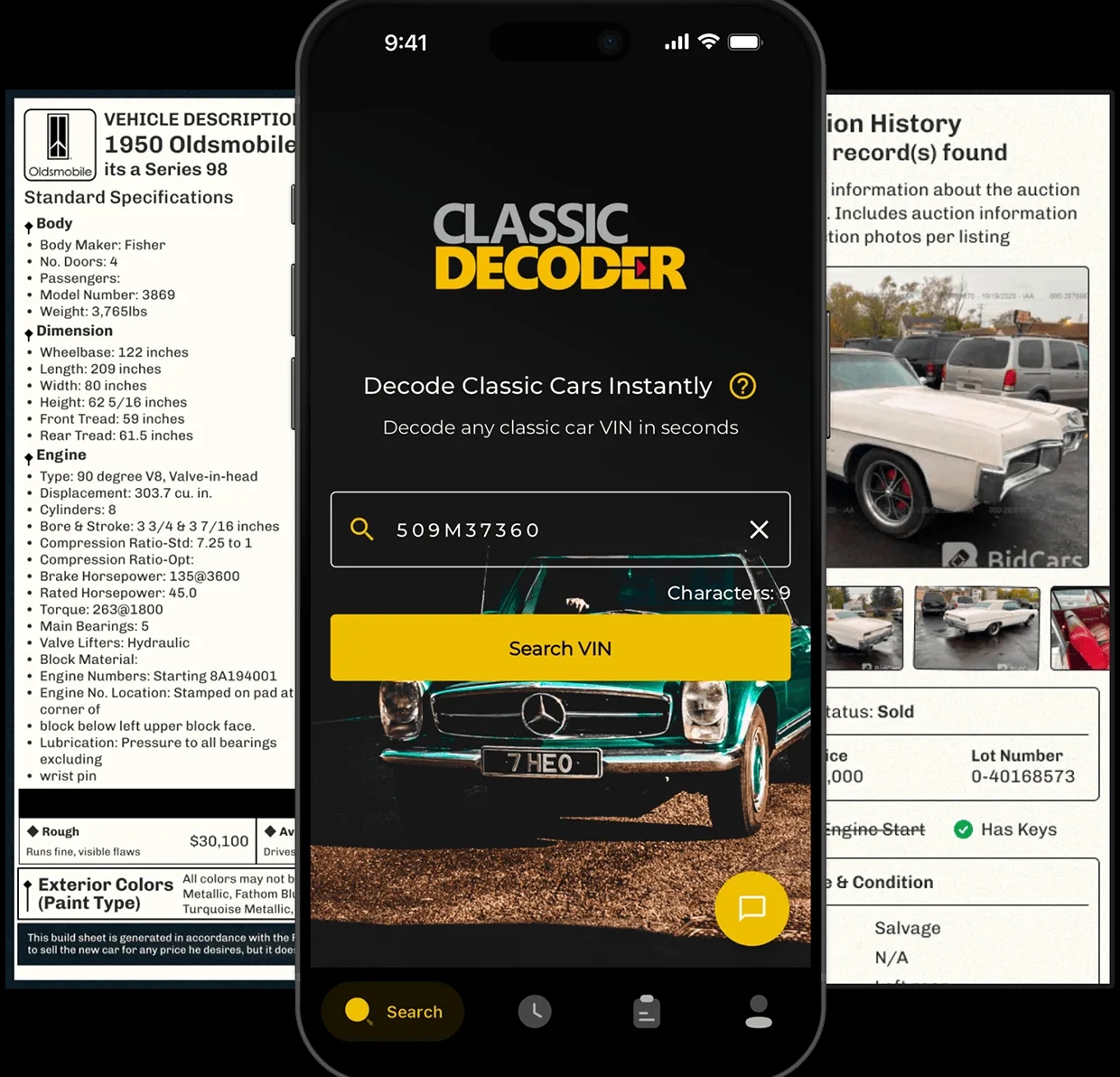1966 Dodge Polara
The '66 Dodge Polara: a cool, classic cruiser! Think big, boxy, and undeniably American. Part of Dodge's successful lineup, it wasn't flashy, but reliable and represented a strong postwar vibe. Its clean lines and available hardtop made it a popular choice, cementing its place in 60s car culture.
Decode Classic VINs to Get Vehicle History Report and Build Sheet
Exploring the Classic 1966 Dodge Polara: An Icon of American Automotive Culture
The 1966 Dodge Polara stands as a quintessential piece of American automotive history, blending performance, luxury, and cultural significance into one sleek package. This car is part of the iconic third generation of the Polara lineup, launched in 1965, and quickly established itself as a favorite among classic car enthusiasts. With engine options ranging from a standard 225 cubic inch (3.7 L) slant-six to a powerful V8, the Polara offered something for everyone—drivers seeking comfort, performance, or a bit of both.

1966 Dodge Polara Models:
Select the vehicle's model to see the correct data for it.
How Much is Dodge Polara Worth?
Original MSRP :$2,874.00
Outstanding
Clean
Average
Rough
1966 Dodge Polara Specs
Interested in buying a classic car or selling one?
Access detailed history reports for classic vehicles from hundreds of manufacturers.
- Accident Records
- Theft Records
- Loan & Lien Information
- Auction Information
- Salvage Information and more

History of the 1966 Dodge Polara
The evolution of the Dodge Polara into a full-size vehicle was groundbreaking. In 1966, it introduced models like the Polara 880 and 440 and a new base model simply called Polara. Introduced alongside the Monaco model, which would eventually replace the Custom 880 as a mid-level offering, the Polara was well-known for bridging the gap between luxury and performance vehicles.
Learn more about a classic car: Get Build Sheet by VIN.
Access reproduced classic build sheets to learn more about your classic vehicle details.
- Standard Specifications
- Original Base Price
- Standard & Optional Equipment
- Exterior & Interior Colors
- VIN ID & Location description

Specifications of the Dodge Polara
Under the hood, the 1966 Polara could be outfitted with a range of engines. The base model featured a 225 cubic inch slant-six engine, but for those with a penchant for power, V8 options were available in 318, 383, and the mighty 440 cubic inches. This versatility made it a powerhouse in its class, often adored by drivers who craved speed and reliability in a luxurious package.
Famous Figures Who Own the 1966 Dodge Polara
Jim Morrison
Yes, the legendary frontman of The Doors himself was a proud owner of a 1966 Dodge Polara. It's said that Morrison's connection to the vehicle spoke volumes about his appreciation for American muscle and style—a true symbol of the countercultural spirit of his era.
Pancho Villa
Interestingly enough, Pancho Villa, the formidable Mexican revolutionary, is also listed among notable owners. His ownership mirrors a time when such vehicles symbolized both status and utility.
Hulk Hogan
Wrestling superstar Hulk Hogan is another figure linked to this classic, embodying the car's enduring appeal to entertainers and athletes alike.

Polara's Pop Culture Imprint
Beyond the speed and the design, the Dodge Polara has earned its stripes by appearing in the limelight of film and television. From high-speed chases in "Bullitt" to stylish appearances in the "Fast & Furious" series, it's been the go-to for filmmakers aiming to capture a slice of American automotive charm. How cool is that? It's not just a car—it's a piece of ongoing cultural narrative.
The Market and Collectibility
The market for the 1966 Dodge Polara remains robust. Collector interest keeps prices relatively high, with auction records showing a range from $10,000 to over $30,000 depending on the vehicle's condition and restoration. It seems this car isn't just a collector's dream; it's an investment into a piece of the American spirit.
Interested in Buying or Selling a Classic Car?
When dealing with classics like the Dodge Polara, having the right documentation is crucial. Two documents are central for buyers and sellers alike: the vehicle history report and the build sheet. Here's why they're essential:
Accident Records: Understand what the car's been through.
Theft Records: Make sure it's a clean title.
Loan & Lien Information: Avoid financial surprises.
Auction Information: Prior sales can provide price benchmarks.
Salvage Information and more: Know if it's been restored from a wreck.
Check out services like tool for more detailed insights. Don't forget the to help understand older and custom builds! For older models, a tool like a could be invaluable. And if you're dealing with early variants, be sure to look into a as well. Having all info, like the , is a plus when entering the classic car community.
Understanding the depth of this vehicle's history, from its pure muscle under the hood to its starring role in the annals of pop culture and famous personalities, the 1966 Dodge Polara is truly a pinnacle of automotive excellence. Whether you're a collector, a nostalgic enthusiast, or just someone exploring the rich heritage of American cars, the Polara offers a fascinating glimpse into a past where horsepower met elegance on wide-open roads.
Classic VIN Decoder App |Now available on both Android and iOS!
At Classic Decoder, we believe that developing a mobile app is a great way to extend our classic car data solution hub to as many users as possible across the globe. Our app is built with users and precision in mind. It holds the key to unlocking the history and details of any retro car at your fingertips. It also comes with fascinating and user-friendly features that make it stand out from other mobile apps designed for this purpose.
The Classic Decoder app lets you decode and lookup any classic VIN in a flash. Access accurate vehicle information and history, make an informed decision faster, and buy and trade in classic cars with confidence.

Download The Classic Decoder App now.
Some unique features include:
- Support all classic VIN lengths from 5 to 13 digits
- Support classic cars produced from 1910 – 1980
- Online Garage features – to add and manage your vehicles
- 24/7 Customer Support
- Easy onboarding for first-time users
Explore Dodge Polara from Other Years
Frequently Asked Questions
Well, the '66 Polara? Think of it as a real head-turner, especially for its time. It sported a longer wheelbase than its predecessors, giving it a really sleek, stretched-out look; kinda like comparing a hot dog to a super-sized one, you know? Key features included its distinctive body styling, characterized by its crisp lines and prominent tail fins – a real statement piece! Depending on the trim level, you'd find different interior appointments and engine options; some were real sleepers, while others boasted impressive power. You’ll find that those models are a bit of a mixed bag, though, with some very different levels of refinement.
Ah, the powerplants! Dodge offered a pretty decent range back then. You could get anything from a relatively tame 273 cubic inch V8, perfect for a daily driver, all the way up to a seriously potent 426 cubic inch Hemi, which was a real beast. Those Hemi models? Forget about it, they're legendary. In between, you'd find other V8 options like the 318 and 383, each with its own personality – some more fuel-efficient, some geared more for performance. It truly depended on what you were after. So, yeah, finding a specific engine configuration will mostly depend on which Polara you’re looking at.
That’s a great question! It really depended on what you were looking for, you see. Compared to something like a Chevy Impala or Ford Galaxie, the Polara offered a unique blend of style and performance. It definitely held its own in terms of size and presence; it wasn’t just another fish in the sea, ya know? Some might argue the Polara had a more sophisticated look, others may have preferred the muscle-car styling of competitors. It's all about personal preference, really. Bottom line, it was in the thick of the muscle car craze, competing with other American iron for supremacy. This means you’ve got a range of different personalities to choose from. And then there's the price – that was a whole different story.
Now this is tricky; values fluctuate wildly depending on condition, trim level, and the all-important engine. A completely restored, numbers-matching Hemi Polara? That could fetch a pretty penny, I'm talking a serious amount of cash! A more average example, needing some TLC? Well, that'll be considerably less. It's best to consult current classic car valuation guides and check recent auction results for the most accurate estimate. Think of it like real estate; location, location, location! Only in this case, its condition, condition, condition!
Owning a classic car, especially one from '66, is a labor of love, my friend. Parts can be hard to come by; you'll need to scour the internet, attend swap meets (those are fun!), and maybe even become friends with some salvage yards! Finding someone with the right expertise to work on these oldies is another hurdle; they’re not exactly a dime a dozen. Rust is a common enemy, particularly in the body and undercarriage – this is usually due to the elements. So keep an eye out for that! But despite the challenges, the satisfaction of bringing back to life a piece of automotive history is undeniably rewarding, kind of like restoring an antique piece of furniture.

